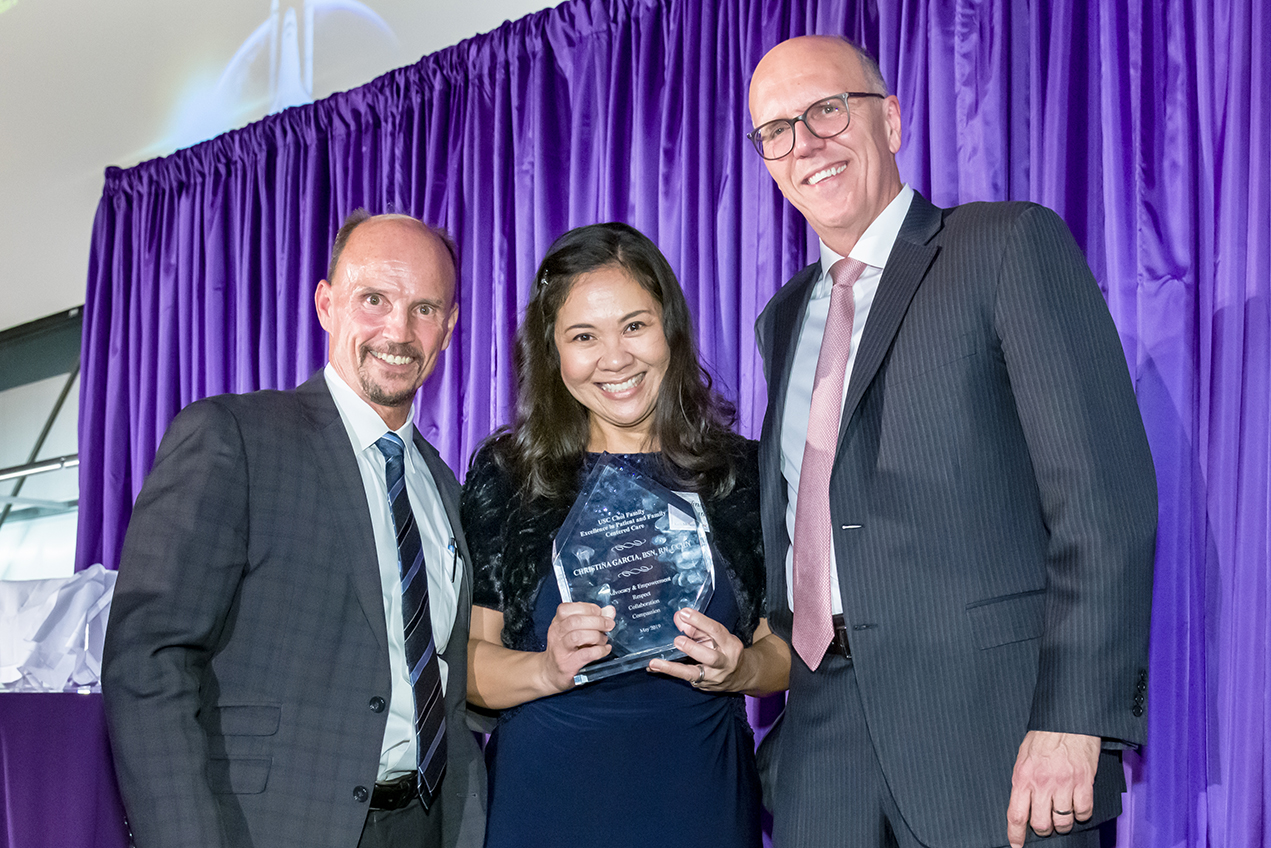For Christina Garcia, BSN, RN, CCRN, care is a reciprocal relationship, one in which both the patient and the care provider learn and grow from each other.
“I learn a lot from my patients and their families,” Garcia said. “These are people from diverse socioeconomic, cultural and religious backgrounds. Because of these differences, I try to better distribute care by being sensitive to where they are and who they are. I always listen to them and not just give what I think they need or want.”
Recently, Garcia was honored with one of the USC Choi Family Awards for Excellence in Patient-Centered Care, which recognize nurses, fellows, physicians, non-clinical staff and departments for demonstrating patient-centered care, compassion and excellence. The awards are part of the USC Choi Family Excellence in Patient-Centered Care Endowment established in 2016 by Keck Medicine of USC through a generous gift from the Choi family. Each awardee receives $2,000, along with an additional $2,000 for their department to be used for programs, training and activities to support and foster superior patient-centered care.
Garcia received her bachelor’s degree in nursing from Azusa Pacific University. From there, she began her health care career at Shriners Hospital for Children and later at St. Luke Medical Center in Pasadena. When St. Luke’s closed, Garcia transferred to Keck Hospital of USC and currently is working as a staff nurse in 7 West ICU.
When did you first become interested in pursuing a career in health care and why do you still feel compelled to work in your chosen field?
In high school, I volunteered with developmentally challenged individuals, the elderly in hospice care and the homeless in Downtown Los Angeles. I continued to do this throughout my college years and after. I found enjoyment and fulfillment in serving, learning and being with vulnerable populations, especially witnessing their smiles and growing positivity. However, there came a time when I felt burned out, and that my emotional glass was almost empty. I began questioning the meaning of my life and career. So, I quit my job and spent six months volunteering with Mother Teresa Homes among the poorest of the poor in Kathmandu, Nepal, and Kolkata, India. It was the hardest yet most rewarding experience of my life. I got to be among men, women and children who were handicapped, unwanted, parentless and who possessed diseases such as leprosy. It was an eye-opening and humbling experience. As I worked amongst the poor, I became aware of my own spiritual and emotional poverty, including my weaknesses and flaws. It was difficult to face these revelations, but also very enlightening. I felt freedom and release as I went through the process. I embraced my brokenness and realized it’s okay to “be.” Be myself with limitations, goofiness and imperfections. This realization is what motivates me to serve patients and their families in a holistic way.
The mission of the Choi Family Endowment is to ensure consistent delivery of patient- and family-centered care that will inspire and engage physicians and staff. What are important, yet often overlooked ways, staff can engage with patients in a more personal and meaningful way?
In the midst of alarms, machines, charting, protocols and so on, I try to slow down and stay at my patient’s bedside. There, I listen, look and observe their facial expressions. I try to hear out my patient and their family’s questions and concerns, which sometimes come through tears and anxiety. I try to listen to their heart and notice their unspoken words. Sometimes, I pray alongside them, dance with them, turn on some music, or just joke around. I want to do whatever it takes to ease their pain, fears or frustrations. My daughter, who has Down syndrome, was in the ICU for five days. During this time, I was so scared, stressed and tired. I understood what “ICU psychosis” was. So, with my patients and families, I can only try to meet them where they are. Try to put myself in their place and think, what would I appreciate being done for me?
A health care environment is often busy and complex. How do you overcome everyday frustrations and stress in order to communicate with patients and their families properly and continue making them a priority?
I am always here for them. In my role, I have to choose to put aside my personal problems to be there for my patients and their families. I arrive early in the morning to have a little “me” time before the busyness of the day. I pray and also have taken up yoga to give myself the kind of care and ease that I can then bestow upon others. Patients and their families go through so many things that I cannot begin to imagine. All I can do is try my best to make their time less frightening and stressful by paying attention to them.
What does receiving this honor mean to you?
I am grateful and honored – grateful for God’s grace, grateful for a supportive, loving family and grateful to be among awesome coworkers in 7 West ICU. I am sincerely humbled for receiving this award. Thank you.
— Matthew Vasiliauskas


